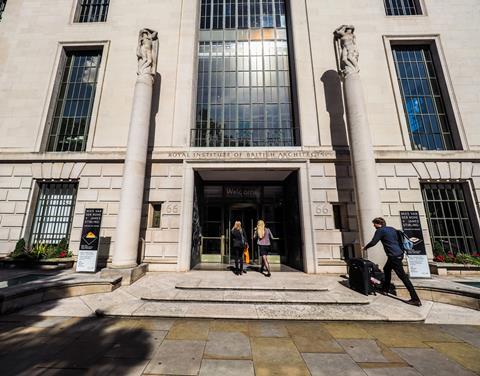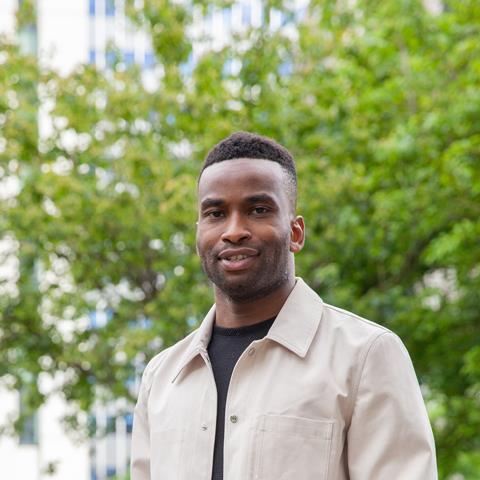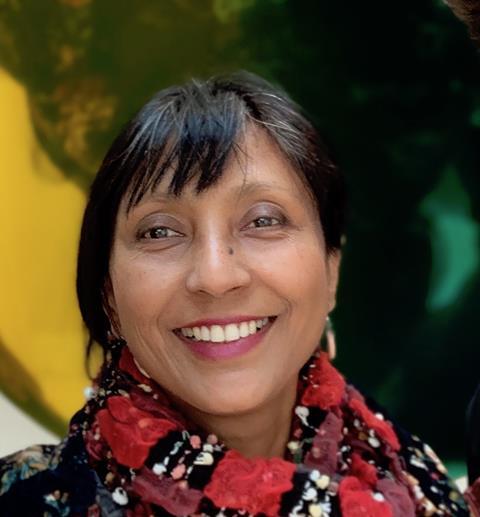Jo Bacon, Muyiwa Oki and Sumita Singha set out their stalls following final hustings

The three candidates for RIBA’s next president have unveiled their manifestos following yesterday evening’s public hustings.
Jo Bacon, Muyiwa Oki and Sumita Singha have outlined what they would do during their two-year term if they win next month’s election - which opens for voting today - with common themes including diversity, competence and tackling the climate crisis.
Bacon, who is managing partner at Allies & Morrison and already works at RIBA both as a councillor and on the board as the member responsible for culture and events, said one of her main objectives is to bring the institution’s operations under budgetary control.

Earlier this year, RIBA announced it was cutting 20 jobs in a bid to plug an £8m deficit despite also pressing ahead with plans for a £20m refurbishment of its 66 Portland Place headquarters - a job which was awarded to Benedetti Architects last month.
Bacon said last night that current president Simon Allford had already done much of the work in tackling the deficit, but that the next president “must bring these initiatives to fruition and ensure the institute is engaging and relevant.”
She said she had worked through three recessions during her 35-year architectural career, and her leadership of Allies & Morrison over the past decade has been a role which requires “strategic skill, empathy, collaboration and the ability to get things done”.
Asked what the RIBA could do better, she admitted the institution “haven’t been very good at communications” and that promoting its broad range of activities to members and the public was “mission critical”.
On education, Bacon said part III qualifications had become “too much of a fee earner”, and that the UK should be able to train architects in a shorter period.
And she weighed in on the current debate around the culture of architectural education in the wake of the report on abuses at the Bartlett, arguing that RIBA had a duty of care for students in validated schools and that this should be “restated and considered” in the institution’s validation committees.
All three presidential candidates require at least 60 nominees to get on the ballot, with Bacon’s including BD columnist Eleanor Jolliffe, Amin Taha, Alison Brooks, Andy von Bradsky, current RIBA board chair Jack Pringle, John McAslan and Simone de Gale.
Singha’s backers include architectural photographer Morley Von Sternberg, Peter Barber and Satish Jassal, another Building Design columnist.
Oki, a salaried architect who currently works at Mace, has been nominated by former RIBA presidents Alan Jones and Ben Derbyshire and 2018 presidential candidate Elsie Owusu.

The 31-year-old said in his manifesto that he wants to “speak up for the future of architects” and to steward “bold institutional reform, galvanise the architectural profession and incorporate the energy and voice of unrepresented members”.
He said the architectural profession is based on overwork and underpay, and that confidence in the RIBA’s ability to deliver change is at an “all-time low”.
At last night’s hustings he said that the institution can regain its relevance among architects by raising education standards, creating a more robust code of conduct and by introducing more transparent and democratic engagement models.
“RIBA claim to be a collective voice of architecture, and I want to see our members hearing that voice,” he said.
Oki says in his manifesto that the profession is currently “in service to the wealthy, the privileged, and the well-connected”, and that as president he would “meaningfully” engage and listen to students, future architects and early and mid-career RIBA members.
He also says that he wants the institution to be “constantly communicating” with its regional membership in the UK and internationally through quarterly town halls.
Increasing engagement with RIBA branches outside London was an agenda shared by all three candidates, along with creating better services for members and improving access to the institution’s collections using digitisation.
Singha, who is the founder of Ecologic Architects and also serves as a RIBA councillor and on the board as member responsible for education, said that she would press for a “presence” in each of the institution’s 12 UK regional branches.
She said this would energise volunteer commitment along with opportunities for members to network and meet with regional staff through exhibitions, monthly ‘drop in’ practice sessions or CPD sessions at hired venues or member offices.

She also said she wants RIBA to offer its own PI insurance with reduced premiums for those not undertaking risky work, and would lobby for a government backed insurance scheme for those working in building safety or sectors affected by climate change.
On net zero, she said she will lobby for chartered practice status to include mandatory environmental and carbon targets, and encourage these practices to work on net zero and retrofit projects.
She also said she will call for competency tests to be mutually recognised by professional bodies and proposed that core CPD topics be offered free to RIBA members.
On education, Singha said she will advocate for integrating into the curriculum a “recognition and redress of predominant colonialist social narratives and emphasise the critical role that diversity and inclusion plays in fostering creativity, equity and respect.”
Singha, who received an OBE for architecture in 2021, studied at the School of Architecture and Planning in New Delhi where she said she was so poor that she would sleep on the same table that was used for her studies and for eating.
She came to the UK on a scholarship to the University of Cambridge, where she was the first woman to study for an MPhil in environmental design. In 1993, at the age of 26, she set up her practice, which specialises in sustainable and community projects.
Voting for the next RIBA president opens today and will close on 26 July, with a winner due to be announced on 2 August.
















2 Readers' comments